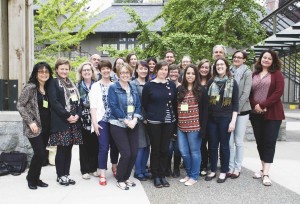CanLit Guides Workshop – May 25-26, 2016
Jun 23, 2016
From May 25 to 26, 2016, Canadian Literature hosted scholars from across the country for the first CanLit Guides Workshop at UBC’s Vancouver Campus. The workshop aimed to foster a sense of community amongst post-secondary educators specializing in Canadian literature, generate discussion on approaches to teaching CanLit, and produce new chapters for CanLit Guides (an open-access teaching resource produced by Canadian Literature).
The event marks a shift in how we produce CanLit Guides: previously, chapters in the guides were written in-house by editors and graduate students; now, we have transitioned to a system where area specialists write chapters. Prior to the workshop itself, participants drafted 16 new chapters on a wide range of topics (from Marie Clements’ Burning Vision to diasporic studies to comics and more). Then, participants gathered at UBC for a series of highly collaborative sessions to offer each other peer-review feedback on chapter drafts. Participants also discussed approaches to teaching and the future of CanLit Guides. The workshop was an opportunity for a community of academics to come together as teachers, share ideas about pedagogy, and translate research expertise into classroom learning.
Thanks to the generosity and enthusiasm of our participants, the workshop was an energizing and productive event. Keep an eye out for new CanLit Guides chapters in the next year and, in the meantime, be sure to take a look at the newly redesigned website. Photos of the workshop can be found on Canadian Literature‘s Flickr page.
Canadian Literature would like to thank the following people and organizations for making the 2016 CanLit Guides Workshop such a success:
Workshop Participants
Sarah Banting, Shelley Boyd, Clint Burnham, Nathalie Cooke, Nadine Fladd, Brenna Gray, Ceilidh Hart, Tiffany Johnstone, Christine Kim, Lucia Lorenzi, Bronwyn Malloy, Sophie McCall, Brendan McCormack, Farah Moosa, Gillian Roberts, Shannon Smyrl, Katja Thieme, Camille Van der Marel, Carl Watts
Canadian Literature Team (Workshop Organizers)
Laura Moss, Kathryn Grafton, Donna Chin, Sheila Giffen, Josephine Lee, Christy Fong, Zoya Mirzaghitova
Sponsors
- Social Sciences and Humanities Research Council of Canada
- Hampton Fund (UBC Office of the Vice-President)
- UBC Faculty of Arts
- SFU English Department
- UBC English Department
- UBC Centre for Student Involvement & Careers Work Learn Program
- Green College
- UBC Centre for Teaching, Learning, and Technology
- SPARC (Support Programs to Advance Research Capacity)
- Development and Alumni Engagement, Faculty of Arts, UBC
- Museum of Anthropology
- UBC Bookstore
Welcome to the New CanLit Guides
May 19, 2016
In support of our ongoing commitment to improving and enhancing the CanLit Guides, we are excited to announce some major updates to the website.
Many of these changes derive from the first CanLit Guides Chapter Workshop (May 2016), where Canadian literature scholars converged for two days of chapter writing, peer editing, and discussion about the future of CLG. The participants provided many thoughtful and attentive remarks about the website, for which we are extremely grateful. Based on their feedback, we have added new web features and an updated look and feel, as well as incorporated responsive design for desktop, tablet, and mobile access.
One important change is that instructors no longer have to create accounts and login to create curated guides. Instead, any user can add chapters to a reading list, which will be sent to their email. The list can be added to syllabi or redistributed as many times as needed, to students, other instructors, and more. For more information, see the “How to Use” guides on the CLG homepage.
Other features include:
- An updated homepage that emphasizes our range of chapter categories;
- Print or save the pages as PDF for offline use;
- A dynamic “All Chapters” page for quick and easy reading list selections;
- Filter and view chapters by category or by theme;
- And so much more!
We welcome your feedback and suggestions on the new website, especially if you notice any broken links or functionality. Don’t forget to update your bookmarks, and we hope you enjoy the improvements!
Reporting Broken Links on CanLit Guides
Feb 03, 2016
Canadian Literature has recently migrated to a new website, and some links on CanLit Guides have been affected by this change. If you notice any broken links or faulty PDF downloads, let us know at canlit.guides(at)ubc.ca. Please include the URL of the affected page and a list of the broken links, so that we can quickly amend the issue. Our team is working as efficiently as possible to ensure a smooth transition to the new Canadian Literature website. Thank you for your cooperation and understanding.
National Poetry Month 2015
May 06, 2015
April is National Poetry Month, and this year’s theme focuses on food and poetry. Vancouver’s Poet Laureate, Rachel Rose, declares in her inaugural speech that “food is personal, political, sensual and powerful.” Poetry is inextricably connected to the way we perceive the world, andCanLit Guides provides a study of its engagement with one of these senses: sight and visuality. Head over to Poetic Visuality and Experimentation to learn about how poets such as Jordan Abel, Eric Zboya, and Rita Wong have played with visual form to unsettle our expectations.
To learn more about how to close read poetry , check out our dedicated Research Skills section for explanations, exercises, and examples.
Governor General’s Literary Award: Thomas King
Dec 04, 2014
We are pleased to congratulate Thomas King on winning the Governor General’s Literary Awards 2014 fiction prize for his novel, The Back of the Turtle (2014).
We feature a module on King’s Green Grass, Running Water (1993). The guide provides an overview of key themes, critical questions, and suggested assignments, as well as an exercise on how to participate in/respond to journalistic academic discourse.
To learn more about reading, engaging with, and studying Indigenous works in Canada, check out our Introduction to Indigenous Literatures in Canada: Listening to Stories.









 ©
©